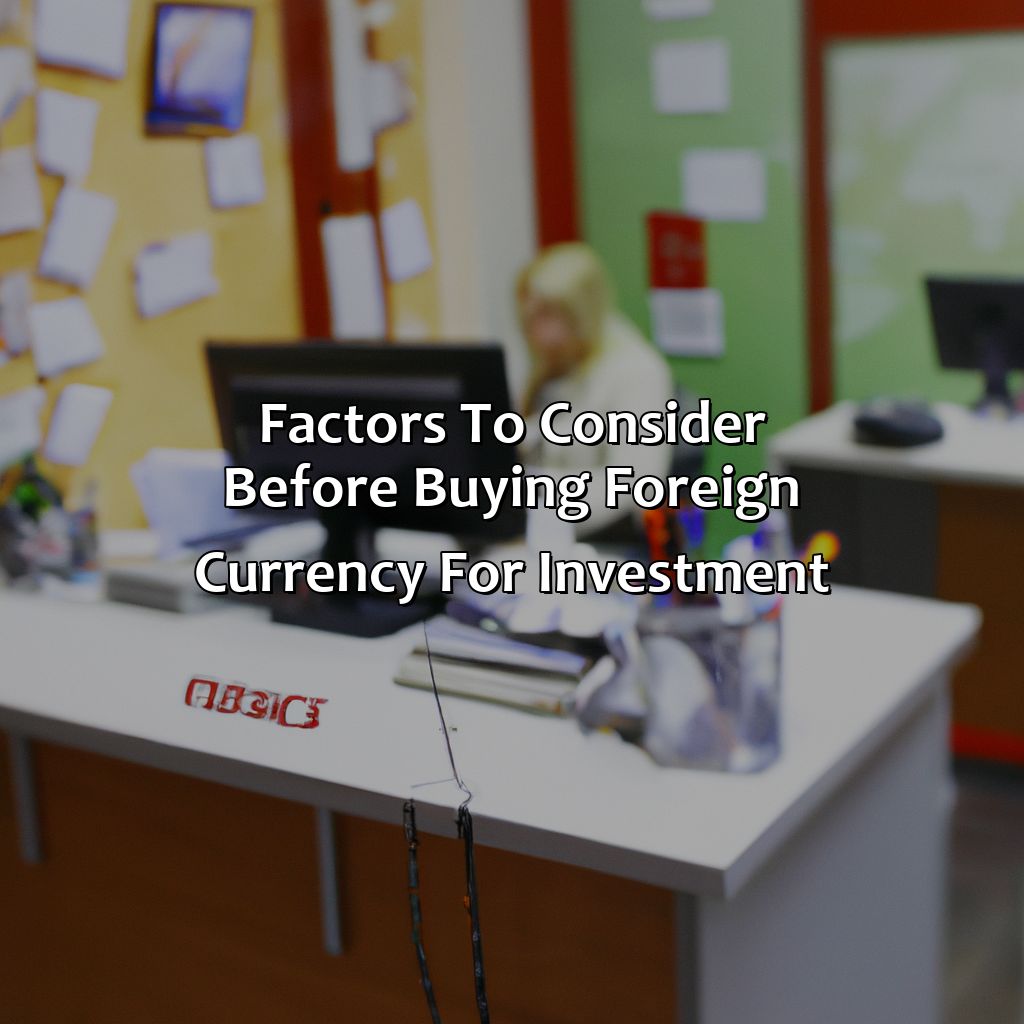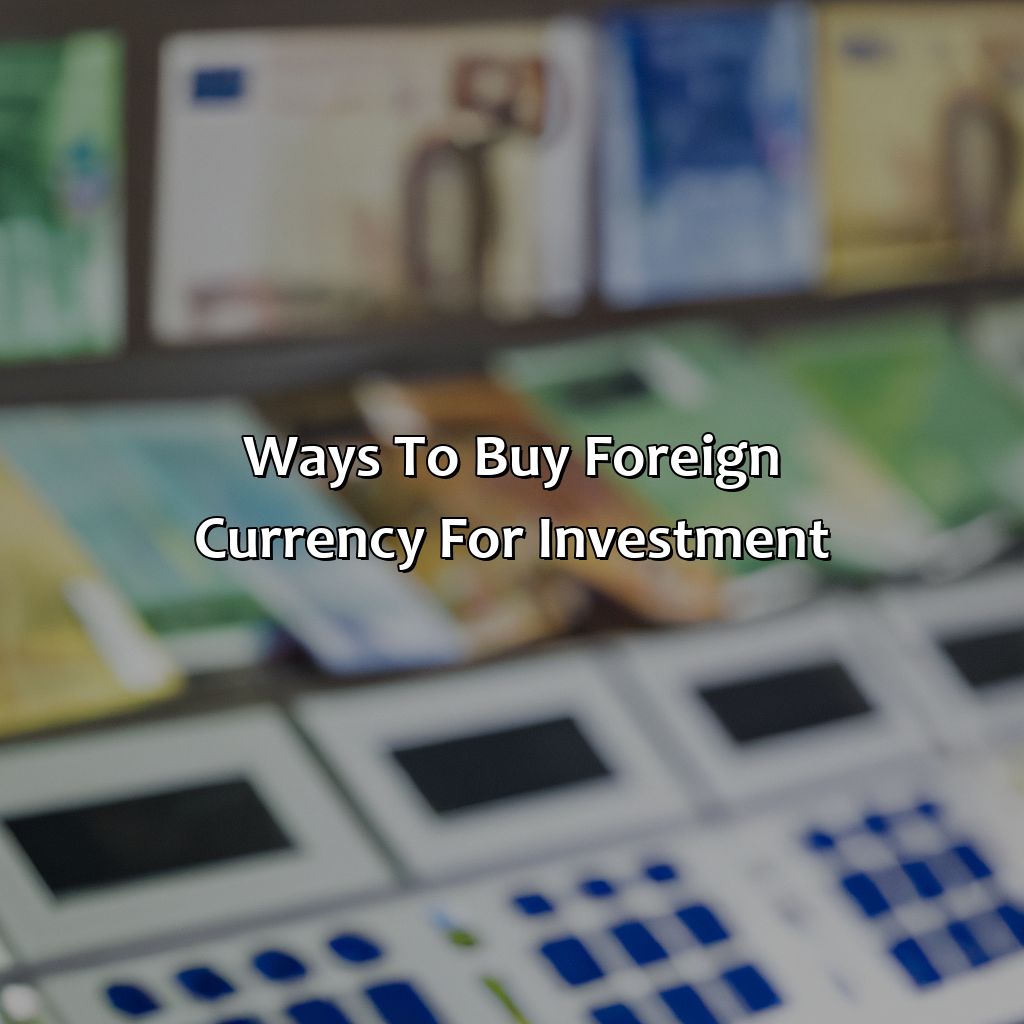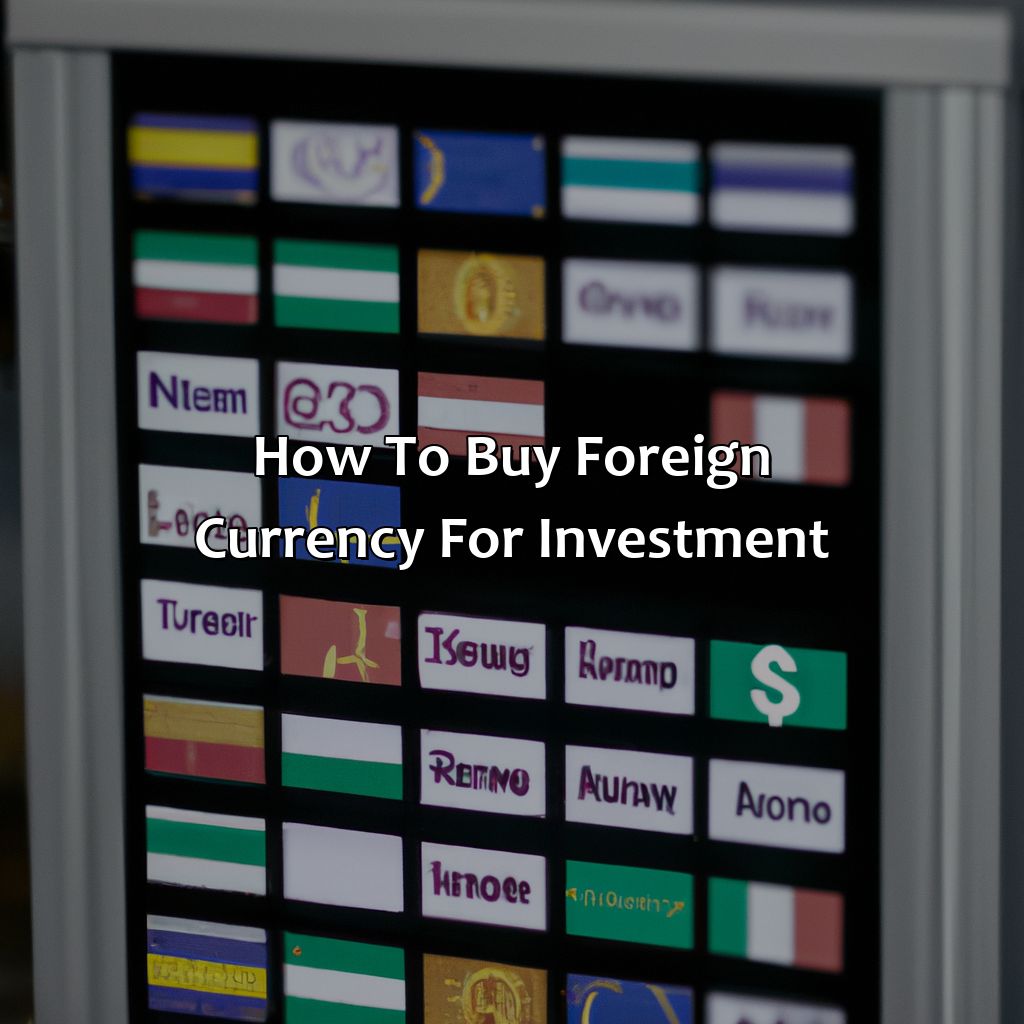How To Buy Foreign Currency For Investment?
Key Takeaway:
- Factors to consider before buying foreign currency for investment include economic and political stability of the country, exchange rate fluctuations, and investment goals. These factors can significantly impact the value of the investment.
- Ways to buy foreign currency for investment include online foreign exchange brokers, the foreign exchange market, banks and credit unions, and travel agencies. It is important to research and compare rates among different options to find the best deal.
- Tips to keep in mind when buying foreign currency for investment include tracking exchange rates, avoiding impulsive decisions, diversifying your portfolio, and seeking professional advice. These can help minimize risks and maximize returns on the investment.
Are you considering investing in foreign currency but don’t know where to start? In this blog, you’ll get an insight on how to buy foreign currency for investment purposes. This guide will help you understand the risks and rewards involved in investing in foreign currency.
Factors to Consider before Buying Foreign Currency for Investment
In order to make wise decisions when buying foreign currency for investing, it’s a must to take into account various aspects. Assess the country’s economic and political stability, exchange rate fluctuations, and your own investment goals. Doing so can aid you in deciding the best plan of action and reduce the risks.

Image credits: retiregenz.com by David Woodhock
Economic Stability of the country
When investing in foreign currency, one of the crucial factors to consider is the financial stability of the respective country. The economic stability of a nation plays a significant role in determining its currency’s worth. As an investor, it is essential to analyze a country’s political and economic state before making investment decisions.
Investors must pay attention to each country’s interest rates, inflation rate, debt ratio and fiscal policies because they affect the value of the currency. Economic data such as Gross Domestic Product (GDP) and Balance of Trade (BOT) should also be considered before buying foreign currency for investment. The higher and more stable these figures are, the more appealing a currency becomes.
Foreign exchange rates are continuously changing, so investors need to keep up with every change that occurs on a real-time basis. Understanding currency fluctuations and their cause enables investors to anticipate exchange rate movements better, leading to successful investments.
Before investing in foreign currency, make sure the country isn’t experiencing more drama than a Real Housewives reunion.
Political Stability of the country
Assessing the Political Landscape for Buying Foreign Currency as an Investment
Investors must evaluate the political situation of any country before purchasing foreign currency as an investment. Politically stable countries typically have a reliable and predictable business environment, reducing investment risks.
Political stability can be assessed through a robust rule of law, transparency in regulatory processes, and open communication between policymakers and investors. These factors provide clarity and confidence for investors, ultimately impacting currency value.
In addition to the above factors, understanding a country’s geopolitical dynamics can provide valuable insight into its long-term political stability. Investors should consider historical events, social tensions, and international relations to assess future risks that could impact their investments.
A classic example of how politics can significantly affect currency movements is the 2016 US Presidential Election. Donald Trump’s unexpected victory caused significant fluctuations in currency markets as investors tried to assess his policies’ potential economic effects.
Why bother with roller coasters when you can experience the thrill of exchange rate fluctuations?
Exchange Rate Fluctuations
Investing in foreign currency involves assessing the risks of potential fluctuations in exchange rates. The unpredictable nature of currency values can make it challenging to profit from these investments.
Foreign exchange rates are influenced by macroeconomic factors such as inflation, interest rates, and political upheaval. Economic news and geopolitical events can also impact the value of currencies. These factors can cause sudden and significant changes in exchange rates, making investments in foreign currency risky.
One way to mitigate this risk is to stay informed about current economic conditions and global events that could impact currencies. Careful analysis of these variables can help investors make informed decisions about when to buy or sell foreign currencies.
Pro tip: It’s essential to have a solid understanding of the market before investing in foreign currency. Seek advice from a qualified financial advisor with knowledge and expertise in this area.
Don’t just invest in foreign currency to fund your next vacation, unless you’re planning on vacationing in hyperinflation.
Investment Goals
When considering potential investments, it is important to establish clear objectives that align with one’s overall financial strategy. These “investment goals” can vary greatly depending on the individual’s priorities and risk tolerance, and should be carefully considered before making any decisions.
One important factor to consider when setting investment goals is the desired time horizon for the investment. Short-term investments may prioritize liquidity and stability, while longer-term investments may have more flexibility to take on higher risk in pursuit of potential gains.
Another consideration may be diversification, or spreading out investments across a variety of assets to minimize risk. This could involve investing in multiple currencies or types of securities.
It is also crucial to assess one’s personal financial situation and understand how an investment fits into the bigger picture. Factors like income level, debt obligations, and retirement goals can all influence investment decisions.
Looking back through history, investors have seen the value in setting clear investment goals. From ancient traders diversifying their portfolios with various goods, to modern-day financial professionals mapping out retirement plans, establishing clear objectives has long been a key aspect of successful investing.
Get ready to break out your passport and your wallet, because here are the top ways to buy foreign currency for investment.
Ways to Buy Foreign Currency for Investment
Fancy investing in foreign currency? You’ve got options! Online Foreign Exchange Brokers, the Foreign Exchange Market, Banks and Credit Unions, or Travel Agencies – each one has its pros and cons. Let’s take a closer look at each one to help you decide.

Image credits: retiregenz.com by Yuval Jones
Online Foreign Exchange Brokers
Foreign Currency Investing through Online Brokers
Investing in foreign currencies can be done by contacting online brokers. Here are some important points to consider when dealing with these brokers:
- Online forex brokers offer different trading platforms.
- Forex brokers provide access to global currency markets.
- Brokers give investors access to research and news tools.
- These online brokers charge fees, including spreads and commissions.
It is worth noting that these online brokers’ fees differ from one another and it is important to get a complete breakdown of these costs before investing.
According to Investopedia, “The foreign exchange market has an average turnover of more than $5 trillion per day.” Trading foreign currencies can be like navigating a dark alley, but with the right knowledge, you can come out richer than a king in a palace.
Foreign Exchange Market
The global marketplace where various currencies are traded is a complex and dynamic system known as currency exchange. It is the main vehicle for international trade and investment, with a daily trade volume of trillions of dollars. The market determines the exchange rate between currencies, with fluctuations driven by economic news, political events, and many other factors.
Investors can buy foreign currency for investment in several ways. One option is to visit a bank or foreign exchange office to purchase physical cash or traveler’s checks. Another choice is to open an account with a currency exchange broker and trade online. Additionally, some mutual funds invest in foreign currency as part of their portfolio.
Investing in foreign currency can offer several advantages, including diversification, hedging against inflation and political instability in the home country, and the potential for higher returns due to fluctuations in exchange rates. However, it also carries risks such as volatility and liquidity issues. Investors should research thoroughly before entering this market.
To mitigate risks while investing in foreign currency, investors should consider using stop-loss orders that automatically trigger the sale of assets if they reach a specific price level. It is also essential to monitor economic news regularly and take necessary precautions based on trends and forecasts.
Ultimately, investing in foreign currency requires careful consideration of risks vs. rewards. While potentially profitable when approached carefully, it is not suitable for all investors and may require extensive research before jumping into the market.
Going to the bank to buy foreign currency for investment is like going to the dentist for a root canal – painful, but necessary.
Banks and Credit Unions
Financial institutions like banking companies and local credit unions provide a reliable platform for investors to buy foreign currency. They offer foreign exchange services that can be used to purchase currencies of different countries. These institutions safeguard the funds invested by their customers, which adds to the security of investing in foreign currency.
These establishments have dedicated professionals who help investors understand the nuances of buying foreign currency, guiding them on current market trends and fluctuations. Additionally, these institutions offer competitive exchange rates that make investing in foreign currency more affordable.
In contrast to purchasing through online platforms, buying from financial institutions provides personalized attention and face-to-face interaction with investment advisors. This helps investors achieve a better understanding of market dynamics before making any investment decisions.
One successful example is the Bank of New Zealand’s partnership with Alibaba’s Alipay payment service. The initiative enabled Chinese tourists visiting New Zealand to pay directly using their home currency, and soon enough, it integrated into an accessible event for local residents to use Alipay for their transactions too – signifying growth access across one another’s economies.
Travel agencies: because nothing screams international investment like buying foreign currency from the same place you booked your family vacation.
Travel Agencies
For those seeking to purchase foreign currency for investment, there are several options outside of traditional banks and brokers. One popular choice is utilizing tourism services. They have access to a wide range of currencies and can provide competitive exchange rates.
When considering this option, it’s important to research various travel agencies to determine which ones offer the best exchange rates and lowest fees. Some agencies may also offer discounts or bonuses for larger transactions.
Additionally, it’s essential to ensure that the agency is reputable and trustworthy before completing any transactions. Researching online reviews or checking with regulatory bodies can help minimize the risk of fraud or scams.
By utilizing travel agencies, investors can obtain foreign currency quickly and conveniently while avoiding many of the fees associated with traditional currency exchanges. However, it’s still important to compare rates and do your due diligence before making any financial decisions.
Remember, buying foreign currency for investment is like playing poker with a kangaroo – it’s risky, but if you play your cards right, you’ll come out ahead.
Tips to Keep in Mind when Buying Foreign Currency for Investment
Investing in foreign currency? It is essential to take note of exchange rates and stay away from rash choices. To succeed, this guide can help: “Tips to Keep in Mind when Buying Foreign Currency for Investment” with sub-sections like:
- Monitor Exchange Rates
- Steer Clear of Impulsive Decisions
- Diversify Your Portfolio
- Seek Professional Advice
Each offers great advice to handle the ever-changing foreign currency market.

Image credits: retiregenz.com by Yuval Washington
Keep track of Exchange Rates
One crucial aspect to consider when investing in foreign currency is being up-to-date with exchange rates. Having an accurate understanding of the exchange rate movements can help you make informed decisions and avoid unwanted financial losses.
To keep track of exchange rates efficiently, creating a table could be useful. The table should have columns such as date, currency pair, bid, ask price and percentage change. You can then input the actual data corresponding to every column for various currency pairs to analyze the market trends.
Other vital details to consider are analyzing market trends and fluctuations in exchange rates over a more extended period. Understanding the historical movement of different currencies allows investors to assess long-term trends and predict future movements accurately.
According to history, events such as geopolitical events that cause economic instability in countries often lead to significant drops or rises in a country’s currency. For example, Brexit resulted in a fall in value for British Pound Sterling.
Making impulsive decisions when buying foreign currency for investment is like getting a tattoo of a language you don’t speak – painful and regretful.
Avoid Impulsive Decisions
Making hasty choices can be disastrous when investing in foreign currency. Impulsive decisions may seem appealing, but they carry far too many risks. Take a step back and evaluate all the available options with due diligence before making any decisions.
When it comes to buying foreign currency as an investment, consider several factors beyond just exchange rates. Analyze the economic and political climate of the country whose currency you’re interested in, including inflation rates, debt levels, and geopolitical risks. Always remember that you’re not just buying paper money; you’re purchasing a stake in a foreign economy.
Furthermore, don’t let market hype or your emotions drive your investment choices. Consider financial planning experts or consultants’ advice rather than trusting unverified sources on social media that may mislead you into making the wrong decision.
Investing in foreign currency requires patience, discipline, and a long-term perspective. Keep this in mind while moving forward in your journey of investing in currency exchange rates.
Take action today by educating yourself further on investing principles and strategies so that you don’t miss out on excellent opportunities to invest in lucrative currencies. Keep yourself updated with news released from respective countries to make informed decisions. Remember – never invest without proper research and analysis!
If your investment portfolio was a plate of food, diversification would be the seasoning – don’t be bland, spice it up with foreign currency.
Diversify your Portfolio
Investing in a multitude of currencies is a way to reduce risk and increase potential profits. Diversifying your investment portfolio across multiple foreign currencies can be beneficial in the long run. By doing so, you mitigate the market risks that come with investing in only one currency.
Instead of solely relying on one form of currency, diversification allows you to spread your investments over several types of currencies. This reduces the impact any fluctuations or economic issues may have on your overall investments. Investing in international currency markets also provides an opportunity for high earnings if done correctly.
Experts advise that diversifying investments across different instruments, like exchange-traded funds (ETFs), mutual funds, and bonds, can help create a balanced portfolio with minimal losses. These products offer a range of investment options – and potentially higher returns – that traditional investments may not provide.
Investing in multiple currencies is vital to reducing market risk and building wealth long-term. Taking advantage of the international currency market’s opportunities while spreading out investments could lead to increased gains while providing necessary insurance against economic uncertainty.
Unless you want your investment in foreign currency to be like a foreign language to you, seek professional advice.
Seek Professional Advice
Investing in foreign currency can be a complex and risky process, therefore, it is advisable to seek guidance from a qualified financial advisor. A professional will have the knowledge and experience to guide you towards the best investment decisions, based on your individual needs and goals.
In addition to offering expertise, seeking professional advice can help you avoid potential mistakes or pitfalls that could otherwise be costly. By working with an advisor, you can navigate the complexities of foreign currency investments with confidence.
While there are many resources available for self-directed investors, nothing compares to the insights and personalized guidance provided by a qualified professional.
Moreover, considering recent events such as the Brexit referendum and COVID-19 pandemic, there have been unprecedented fluctuations in the currency market. Seeking professional advice now more than ever is essential for successful investments in foreign currency.
A prime example of this concept would be George Soros’s famous bet against the British pound in 1992. With his team of analysts and advisors, Soros correctly predicted a not so common event that destabilized England’s economy – leading to his $1 billion profit. This story underscores how critical it is to look beyond surface-level trends when investing in foreign currencies – making professional assistance key.
Five Facts About How To Buy Foreign Currency for Investment:
Foreign currency prices can be affected by various factors including economic data, political developments, and global events. (Source: FXCM)
There are several ways to buy foreign currency for investment such as through banks, online currency exchanges, and forex brokers. (Source: The Balance)
Before buying foreign currency for investment, it is important to do your research, analyze trends, and understand the risks involved. (Source: Forbes)
It is advisable to diversify your currency investments by investing in several different currencies in order to minimize risk. (Source: Investopedia)
The value of foreign currency can fluctuate rapidly, so it is important to keep track of market trends and be prepared to act quickly. (Source: The Balance)
FAQs about How To Buy Foreign Currency For Investment?
1. How do I buy foreign currency for investment?
There are several ways to buy foreign currency for investment, such as through a bank or currency exchange provider. You can also use online foreign exchange platforms to make transactions.
2. What are the risks associated with buying foreign currency for investment?
The risks associated with buying foreign currency for investment include currency market fluctuations, political instability, and economic uncertainty. It is important to do your research and monitor market conditions regularly to mitigate these risks.
3. Is it safe to buy foreign currency for investment online?
When buying foreign currency for investment online, it is important to use a reputable and secure platform. Look for platforms that are regulated by financial authorities and have a history of reliable transactions.
4. Can I make a profit by buying foreign currency for investment?
Yes, it is possible to make a profit by buying foreign currency for investment if you are able to accurately predict market trends and make strategic investments. However, it is important to note that there is always a level of risk involved with any investment.
5. Should I consult a financial advisor before buying foreign currency for investment?
Consulting a financial advisor before making any investment is always a good idea, as they can provide valuable advice and help you make informed decisions. A financial advisor can help you determine whether buying foreign currency for investment aligns with your overall financial goals and risk tolerance.
6. Are there any taxes or fees associated with buying foreign currency for investment?
Depending on your country and the platform you use to buy foreign currency for investment, there may be taxes or fees involved. It is important to research and understand any applicable fees before making a transaction.
 Checkout this IRS Loophole
Checkout this IRS Loophole 
